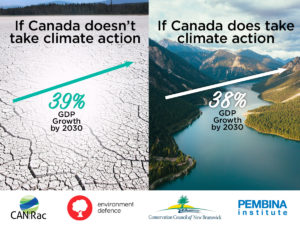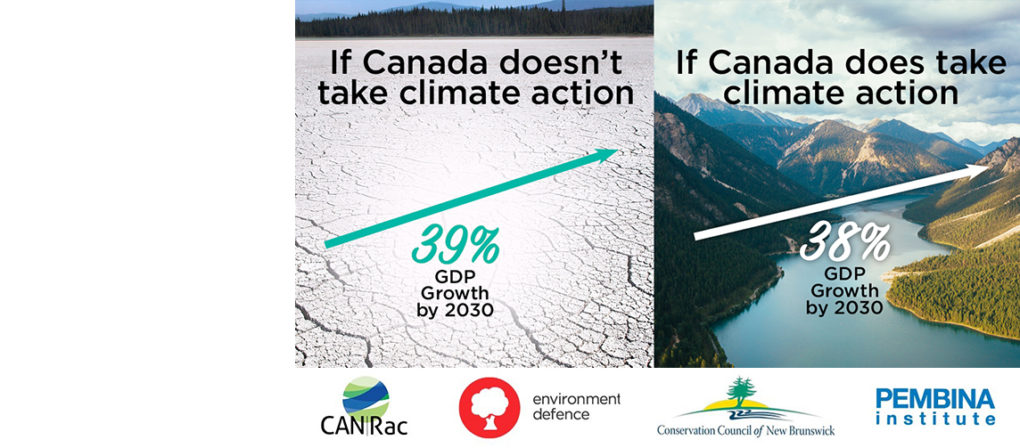
Canada’s GDP is expected to grow at least 38 per cent by the 2030 Paris Agreement deadline, even with greater greenhouse gas reductions than the current federal plan
OTTAWA, ONT. — Meeting Canada’s international climate commitments under the Paris Agreement on Climate Change will have virtually no impact on the country’s continued economic growth, finds research by two of Canada’s leading environmental economists, Dave Sawyer and Chris Bataille. The report on their economic modelling, Canada’s Climate Change Commitments: Deep Enough?, released today by four leading environmental organizations, finds GDP growth of at least 38 per cent if Canada honours its Paris commitments of reducing greenhouse gas emissions to 30 per cent below 2005 levels by 2030, compared to 39 per cent GDP growth if Canada takes no action to reduce greenhouse gases.
“This is one more piece of evidence that there are just as many opportunities in clean energy technologies as in polluting fossil fuels,” said Dale Marshall, National Program Manager at Environmental Defence. “The modelling shows that Canada can take stronger actions to reduce greenhouse gas pollution without harming the economy.”
The modelling further examined how Canada could reach its emissions goal – and found that while the current national plan, the Pan-Canadian Framework on Clean Growth and Climate Change, comes up short, the goal is achievable with current policy tools and existing technology.
“Canadians are increasingly demanding that their government present concrete plans to address climate change and reduce carbon pollution,” said Catherine Abreu, Executive Director of Climate Action Network Canada. “Reaching our climate commitments is do-able, and governments, have a responsibility to work together and demonstrate how they will deliver the results Canadians are looking for.”
“The tools to reach our climate targets are readily available to governments right now,” noted Isabelle Turcotte from the Pembina Institute.“We can take steps now like requiring that new buildings be net-zero energy, increasing the energy efficiency of our appliances, and moving transportation trucks to zero-emission vehicles.”
“This economic research reinforces that climate action and a growing economy are not a zero-sum game. Provinces can step up and do their part with confidence, by matching standards across jurisdictions,” said Lois Corbett of the Conservation Council of New Brunswick.
Canada’s Climate Change Commitments: Deep Enough? calls for Canada’s federal, provincial and territorial governments to increase their greenhouse gas emissions reduction efforts beyond the Pan-Canadian Framework on Clean Growth and Climate Change, in line with the international commitments under the Paris Agreement on Climate Change.
The research was jointly released by Climate Action Network; Environmental Defence; the Pembina Institute; and The Conservation Council of New Brunswick.
The full report can be accessed here: https://environmentaldefence.ca/report/canadas-climate-change-commitments-deep-enough/
About CLIMATE ACTION NETWORK (CAN-Rac) (climateactionnetwork.ca): Canada’s primary network of organizations working on climate change and energy issues, CAN-Rac is a coalition of more than 100 organizations operating from coast to coast to coast. Our membership brings environmental groups together with trade unions, First Nations, social justice, development, health and youth organizations, faith groups and local, grassroots initiatives.
About ENVIRONMENTAL DEFENCE (environmentaldefence.ca): Environmental Defence is Canada’s most effective environmental action organization. We challenge, and inspire change in government, business and people to ensure a greener, healthier and prosperous life for all.
About THE CONSERVATION COUNCIL OF NEW BRUNSWICK (conservationcouncil.ca): Established in 1969, the Conservation Council of New Brunswick has remained the province’s leading public advocate for environmental protection. A member of the UN’s Global 500 Roll of Honour, we work to find practical solutions to help families and citizens, educators, governments and businesses protect the air we breathe, the water we drink, the precious marine ecosystem and the land, including the forest, that support us.
About THE PEMBINA INSTITUTE (pembina.org): The Pembina Institute is a national non-partisan think tank that advocates for strong, effective policies to support Canada’s clean energy transition. We employ multi-faceted and highly collaborative approaches to change. Producing credible, evidence-based research and analysis, we consult directly with organizations to design and implement clean energy solutions, and convene diverse sets of stakeholders to identify and move toward common solutions.
– 30 –
For more information or to arrange an interview, please contact:
Jon MacNeill, Communications Director | 458-8747 (office) | 238-3539 (mobile) | jon.macneill@conservationcouncil.ca
Barbara Hayes, Environmental Defence, 613-255-5724 (cell); bhayes@environmentaldefence.ca

